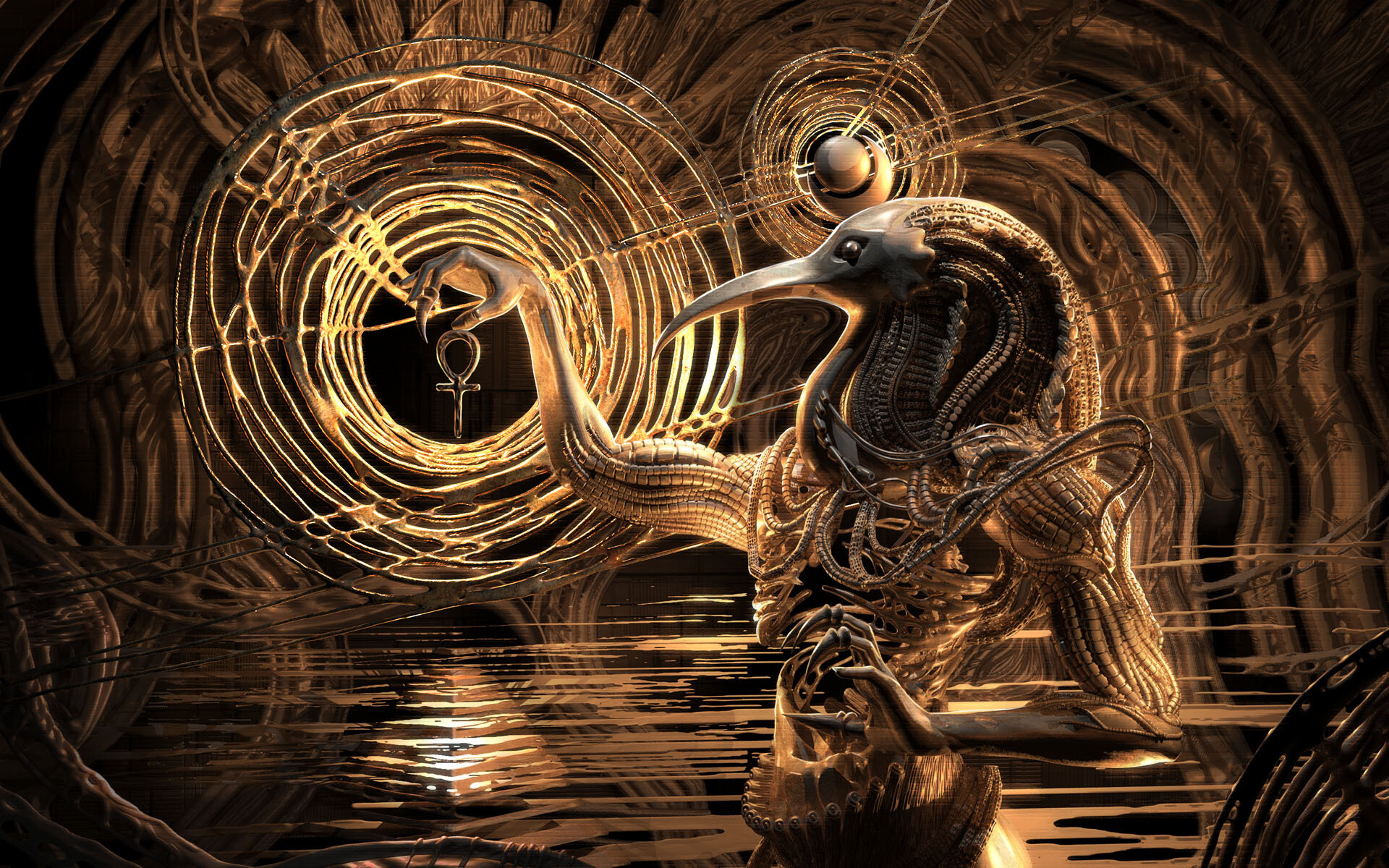Thought’s covert function is to distract our attention away from ‘openness’, even though it will never admit this. Far from admitting such a thing, thought claims is that it is directing our attention towards to something ‘important’, something ‘vital’, which is of course a very different take on the matter! This is thought’s solution to the problem of how to ‘disguise its activities’, so to speak. It keeps on saying “Quick, quick, look at this – this is really important!” Thought is a finger pointing, and it’s always pointing away from openness. Pointing always distracts because pointing always directs our attention from ‘where we already are’ to ‘somewhere else’!
With each ‘movement’ that it makes thought claims to be directing our attention to some external value, or towards some possibility of an external value, whilst in actuality what it’s doing is distracting us away from being aware of openness (i.e. it is ‘blocking out awareness of openness’). Thought is saying that it is revealing an aspect of truth which could potentially be a great value to us (thought always claiming to be drawing our attention to something important) whilst the reality is that it is covering up the truth, obscuring the truth. There’s nothing that obscures reality more than the thinking process; thought is the Great Obscurer! As Jung says, it’s the ‘fool’s lantern’, as Madame Blavatsky says, ‘the mind is the slayer of reality.’
Rational thought will never disclose anything of real interest to us, and yet at the same time it will always pretend to be doing so. In order to understand this point we need to distinguish which between what we might call ‘pragmatic’ or utilitarian’ interest and ‘philosophical or poetical’ interest. Obviously, there’s a very big difference between these two things – matters of ‘pragmatic interest’ can of course be of very great importance at the time, but once the moment of crisis or need is over then it isn’t ‘interesting’ in the same way anymore. It was very interesting because we needed to know about it for a particular reason. Finding a solution to an urgent problem is of interest to us for sure, but not when the problem is solved! We move onto the next problem then. ‘Philosophical interest’ is a different thing entirely therefore – we can discount it as being an indulgence because it doesn’t in the least bit help us with our pragmatic day-to-day tasks, but on the other hand it doesn’t immediately become ‘of no interest’ to us (in the way matters of pragmatic concern do) the moment we have solved to problem or resolved the issue. It doesn’t have anything to do with our humdrum goals or purposes – it isn’t a ‘mere itch that we have to scratch’, in other words. It is something more abiding than this.
As soon as we get this far in the discussion we can see (if we haven’t already done so) that these two types of ‘interest’ aren’t really the same thing at all. Practical or pragmatic interest isn’t actually worthy of the name – is not worthy of being called interest because not actually interested anything else apart from alleviating some sort of momentary discomfort. The world is only of ‘interest’ inasmuch as there exists there exist possibilities within it that we can exploit in order to fulfil our needs. The world is only of interest to me because of what I can get out of it. You are only of interest to me because of what you can do for me! Really therefore I’m ‘interested’ on one thing and one thing alone and that thing is myself.
Even saying this isn’t right however because I’m not genuinely interested in myself either. I’m not genuinely interested in anything; as we have said, I am merely responding to the mechanical pressures that are acting upon me. I am under pressure to complete this or that task and so – all of a sudden I am ‘interested’ in whatever it is that I need to know about in order to fulfil that task. What we are actually calling ‘interest’ here is merely the mechanical pressure acting through me, therefore; it is only it is merely the ‘passing on’ (or ‘acting out’) of that same old mechanical pressure. This mechanical pressure is always there, even though what it will make is do will vary according to the circumstances. In the absence of a ‘philosophical interest’ in the world there can be nothing other than the meaningless ‘passing on’ of mechanical pressure therefore! There is (in a manner of speaking) a ‘type of’ meaning that comes into play as a result of us getting caught up in the predicament of always having to be passing on the mechanical pressure that is acting on us, and that is the ‘meaning’ of having to avoid the pain that comes when we fail at the allotted task, and secure the euphoria and validation that we will get when we are able to successfully ‘obey the machine’. This is the motivation of ‘the carrot versus the stick’ therefore, the motivation of ‘avoiding the punishment and winning the prize’. It is the motivation that drives us when we are ‘controlled by our thinking’.
What we’re talking about here isn’t really ‘meaning’ at all of course, it’s just crude mechanical motivation, it’s just ‘brute coercion’. How can I say that I derive my sense of meaning in life by doing my best to do whatever I’m told to do and by feeling guilty (or feeling that I am a failure) when I can’t? And yet we can’t afford to laugh too much of the absurdity of such a claim because that is the situation we all find ourselves in every day of our lives! This is the only type of life we know – the mechanical version of life where we are what Gurdjieff calls ‘…unconscious slaves entirely at the service of all-universal purposes’. There is no meaning whatsoever in the mechanical life – there is no meaning in it because we’re not in it – we’ve handed over all responsibility to the machine and there is no meaning in the machine. The machine is only the machine! There is no meaning in the machine when it operates us, only when we operate it in accordance with some kind of higher (or non-mechanical) impulse. But for ‘us to operate it’ (so to speak) we have to be there, we have to be actually present, and we’re not.
We are not ‘present’ when the machine operates us because part of the machine’s operation is to replace us with its own version of us, its own ‘abstract generic copy’ of us. There is no meaning in the activities or aspirations of the abstract generic version of us, needless to say! Nothing could ever be more profoundly meaningless than this. When we fall under the sway of the thinking mind (when we are under this sway of the machine) then we become permanently distracted from openness and to be permanently distracted from openness is to be permanently distracted from reality. We don’t ‘pass on mechanical pressure’ because the mechanical pressure is ‘true’, or ‘real’, or because it stands for anything worthwhile but because we are brutally compelled to do so, because we are simply not given any choice. This – needless to say – isn’t the same thing at all! Might is not right. Or as we could also say, where there is authority there is no truth! There are always ‘two choices’ open to us, (so to speak): they are [1] to either accept the ‘so-called truth’ (the ‘version of the truth’) that we have been told, and be rewarded by the machine when we behave appropriately, or [2] to not buy into the ‘so-called truth’, which is to automatically deprive ourselves of the chance of any reward, any validation. This isn’t a ‘choice’ in the usual sense of the word however – we can’t ‘choose’ to attend to openness’! We can only choose between known categories, we can only choose between the various forms of distraction that the categorical mind offers us. How could we choose what we don’t know, and never can know?
There is the constant coercive clamour of the mind-created narrative on the one hand, which is not true and never can be, and there is a completely non-coercive, or ‘still’ nature of openness, which doesn’t say anything, which doesn’t have any goal or agenda, but which is ‘always true’. Stillness never lies, in other words! We can choose or decide whatever we like with regard to the mind-created narrative – our so-called ‘ability to decide’ is part of that narrative – but we can’t ‘decide not to decide’, we can’t ‘choose not to choose’ or ‘have a goal to have no goals’. We can’t compel ourselves to enter into ‘the Realm of the Non-coercive’. Even when it is the case that we get an inkling that there is nothing worthwhile in the domain of thought, and that our interest is best served by moving beyond it into ‘a wider world,’ it is thought that is going to tell us how to do this! This is of course the message behind Krishnamurti’s so-called ‘favourite joke’ –
You may remember the story of how the devil and a friend of his were walking down the street, when they saw ahead of them a man stoop down and pick up something from the ground, look at it, and put it away in his pocket. The friend said to the devil, ‘What did that man pick up?’ ‘He picked up a piece of the truth,’ said the devil. ‘That is a very bad business for you, then,’ said his friend. ‘Oh, not at all,’ the devil replied, ‘I am going to help him organize it.’
Instead of saying something like ‘thought is coercive but never true’, we could also say that thought is ‘hideously meaningless’, or that it is ‘brutally and appallingly nonsensical’. Literal thought is like a loud, angry voice that is talking complete nonsense – there is plenty of emphasis on what is being said but zero content, and it is actually the case that the emphasis is there purely to compensate for that ‘lack of content’. It is as if saying something very loudly can somehow make up for the fact that what we’re saying isn’t meaningful, or isn’t true! We could also say that concrete thought is like a man in a position of authority who imposes his will upon us all, but who is actually a complete and utter fool. We don’t get to see that is a fool because he is such a terrible tyrant and he bullies us into believing him. He browbeats us into believing him. This is of course what all tyrants, all bullies, all ‘authority structures’ do, and thought is no different. So in society (which is a big bully), we automatically believe whatever our social programming tells us is the right way to do things, we automatically see the picture of the world that we have been given as being ‘definitively correct’, but this isn’t true. It simply ‘what we have been told’, and if we took the trouble to look into it we would straightaway see that it isn’t true in the way that it is said to be. And the other side of all this of course is that we very much want the official narrative to be true because that’s where our security lies! It’s not just that the system is lying to us therefore – we want it to lie to us (and we also want not to know that it is doing so). We want to be ‘distracted from openness’, in other words – that’s what we’re really interested in.
Literal statements have no relationship with openness, obviously. If they did then they would no longer be ‘literal’! But because literal or concrete statements – which are the only type of statement that can be made by the categorical mind – don’t have any relationship with openness they also don’t have any meaning. How on earth could they – how can literal or concrete statements, literal or concrete thoughts, have any meaning to them when they don’t have anything to do with openness?
There really is no disputing this – we would be utterly foolish to try to do so. Thought is the right instrument to use for pragmatic for pragmatic purposes but our existence in this world is – of course – more than just a pragmatic matter! We don’t live ‘for a reason’, in other words, and yet the thinking mind has nothing to give us apart from reasons. We need therefore something more than the categorising mind; we need to be able to relate to openness if we are to have any sense of what it means to be actually ‘alive’, but the thing about this, as we have just said, is that we are fundamentally afraid of this aliveness! If we weren’t afraid then we wouldn’t spend all our time living in a world (a world that is no world) that made up of thoughts, made up concepts. We wouldn’t be content with this sort of pseudo-existence. But, on the other hand, it is living in the Purely Conceptual Reality that institutionalises us and makes us afraid of openness, afraid of reality.
This is the deadening effect’ of fear – when we act on fear it this turns us into stone. It ‘petrifies’ us, it ‘concretizes’ us – it plunges us into ‘the literally-understood world’, which is no world at all, no place at all. Thought – from one point of view – is serving us because it is facilitating us in running away from what we fear. But if we look at it the other way we can also say that thought isn’t serving us at all because ‘the one who is afraid’, ‘the one who wants to run away from openness’, isn’t who we really are at all but only the literal token of us, only the mind-produced simulation of us.
Thought – if it is left to its own devices, if it is left to ‘run the show’ – does this very peculiar thing therefore. It creates the Garbage Universe, it creates the Trash Universe, but because we too have been rendered in these degraded terms, we cannot see the garbage to be garbage, we cannot see the trash to be trash. We cannot see the arid nonsense of so-called ‘literal truth’ for what it is, and – what’s more – we positively recoil from doing so. We would all recoil from an awareness such as this, but that’s what it actually is – i.e. it is awareness – and who said awareness would prove to be easy, after all? Although, having said this, very often we are indeedled to believe that awareness is somehow ‘easy’, that it is all about experiencing love and light and divine inspiration and so on; much more pertinently however, awareness (or ‘relating to openness’, is all about seeing our lack of openness – i.e. it is all about seeing the shadow rather than the light, as Jung says. In practical terms therefore, awareness means seeing that we are made of stone! The result of honest self-observation (as opposed to pleasant but misleading fantasy) is that we see (to our horror!) that we are made up of some ‘inert material’ (i.e. the ‘philosophical lead’ of the alchemists) that has no capacity to relate to reality (or life) and no interest either…
Art: wallup.net






